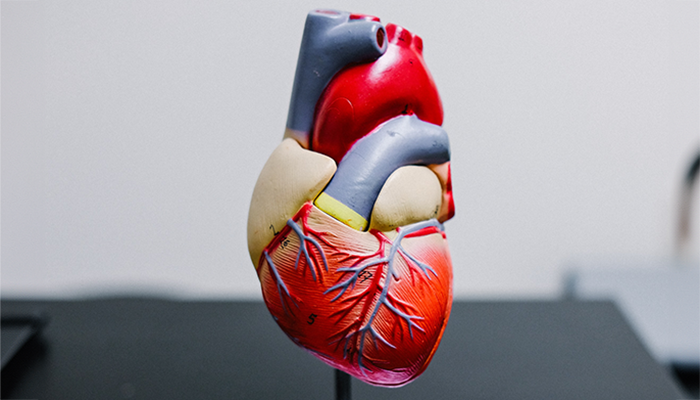The Heart of the Matter: How Cardiology at McMaster is offering patients world-class care at home

For over 40 years, McMaster University’s Division of Cardiology has been at the forefront of advancing heart health through its unwavering commitment to education, research, and clinical care. The Division offers a comprehensive range of programs and services dedicated to improving the lives of patients in Central South Ontario, a region that’s home to 2.3 million residents. Its faculty members and staff also support 17 referring hospitals and urgent care facilities in the Hamilton, Niagara, Haldimand, Brant, and Burlington subregions.
With 50 faculty cardiologists, the Division leads cardiological care across four teaching hospitals within Hamilton and additional hospitals and clinics in the region. A clear and refined pathway of professional development has led to many Divisional successes, with six endowed research chairs on faculty, and plans for more in the coming years.
Champions of cardiac excellence
Cardiology is making a notable impact in educational outreach. With a residency program, led by Matthew Sibbald, that trains 15 residents and has been fully accredited by the Royal College of Physicians and Surgeons of Canada. Further educational offerings include an increasing number of fellowship programs that provide specialized subspecialty training, with three accredited fellowship programs in Interventional Cardiology, Cardiac Electrophysiology and Echocardiography. As of the 2022-2023 academic year, seven subspecialty training programs are on offer to over 42 trainees from across the world.
In alignment with a global mission to foster heart health, the Division champions the HOPE scholarship program. This initiative is instrumental in training medical professionals from low and middle-income nations, including Brazil, Argentina, and South Africa.
Over the past eight years, the Division’s service offerings and specializations have seen significant growth, incorporating new clinical programs such as percutaneous mitral and tricuspid valve programs, and a fellowship program in geriatric cardiology. The Division’s introduction of these programs helps patients across the region conveniently access specialized care delivery in their own community.
“Our team of cardiologists is truly world-class,” says Jeffrey Healey, director of the Division of Cardiology and professor in the Department of Medicine at McMaster University. “The level of quality of our service, our world-wide research impact, and exceptional professional development continue to be the driving factors towards our successes. However, at the heart of all we do, it’s our patients and dedicated team that matter most.”
Research at the heart
Collaborating closely with the prestigious Population Health Research Institute, a joint Hamilton Health Sciences initiative, Cardiology leads world-class research programs in epidemiology, global health, and infectious disease cardiology.
Researchers across the Division routinely publish in top ranked medical journals, including the New England Journal of Medicine, the Lancet, and the Journal of the American Medical Association, collectively publishing upwards of 10 to 20 times annually in these journals.
“Our research is deeply connected to clinical care and the needs of our patients,” says Healey. “We are renowned for conducting large, multinational registries and clinical trials that have influenced cardiology practices worldwide.”
Clinical excellence
A notable asset of the Division can be found at Hamilton General Hospital, home to the Cardiac Care Unit, which has earned recognition as a national leader in critical care cardiology. The unit routinely provides critical care to almost 2,000 patients annually, underlining its role as a designated cardiac center in the region. It offers specialized diagnosis, treatment, and care for heart conditions.
“Our commitment to delivering the highest level of clinical care, especially in critical care cardiology, is what sets us apart,” says JD Schwalm, assistant professor of the Department of Medicine, and faculty member of the Division of Cardiology at McMaster University. “We have one of the largest group of cardiologists with formal additional training in critical care, ensuring our patients receive the best care possible. Patients truly receive world-class care here.”
The Division of Cardiology has fully recovered its service volume since the COVID-19 pandemic, providing Ontario’s highest yearly volume of angiograms and coronary interventions through the Heart Investigation Unit at the Hamilton General Hospital. Specialized care units, including the Arrhythmia Service, demonstrate their dedication by serving over 5,000 patients in device clinics, which implants over 1,000 pacemakers and defibrillators, and performs approximately 800 ablations yearly.
Cardiology remains at the forefront of innovation, integrating cutting-edge technologies and research into their practice, including next-generation medical imaging, usage of treatment devices, and leadless pacemakers.
The impact of the Division of Cardiology
Cardiology has recently introduced specialized inpatient care, with a 10-bed unit at Hamilton General Hospital for patients primarily diagnosed with heart failure. This innovation has streamlined care, leading to reductions in hospital stays, readmissions, and improved transitional care to outpatient follow-up.
Additionally, a new Metabolic outpatient clinic has been established to enhance risk factor management in complex patients following a heart attack. So far, in less than nine months, this clinic has served 400 patients, and has demonstrated a reduction of risk factors in 71 per cent of cases.
“What patients should know is that when they need cardiac care in the Hamilton-region they are seeing a specialist from McMaster and that means something,” remarked Schwalm. “Whether you’re referred to Hamilton Health Sciences, St. Joseph’s Healthcare Hamilton, or another one of our partner sites, all roads lead back to McMaster and our commitment to excellence.”
EducationRelated News
News Listing

Department of Medicine ➚
Pain to progress: An impactful history of lupus research and care at McMaster
Collaborations & Partnerships, Education, Research
December 20, 2024

December 16, 2024

December 10, 2024
